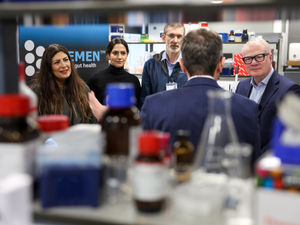University of Wolverhampton researchers developing breast cancer blood test
Breast cancer that is destined to attack the brain could soon be identified with a blood test, new research carried out by the University of Wolverhampton.

Scientists who studied 24 breast tumours that had invaded the brain discovered several faulty gene 'switches' linked to this pathway of cancer spread, or metastasis.
Two of the switches - chemical inserts that turn genes on or off - became defective early on in the development of breast cancer.
Researchers believe they could serve as an early warning signal for tumours likely to head for the brain.
They are now working on a blood test that might be able to detect the faults at an early stage before the cancer has started to spread.
Study leader Dr Mark Morris, from the University of Wolverhampton, said: "Each year the number of women whose breast cancer spreads to the brain is increasing.
"While we know many of the genetic changes behind breast cancer, we know very little about why the disease can spread to the brain.
"By identifying the genes that are switched off or on in breast cancers before they spread to the brain we hope to be able to develop a blood test to spot this change.
"There's also potential for our findings to be used as a starting point to develop treatments that might prevent the spread."
Up to 30 per cent of breast cancers will eventually spread to the brain, often many years after the original tumour has been treated.
Brain metastasis is one of the chief causes of cancer death. Despite radiotherapy and surgery, most women survive just seven months after their breast cancer has reached the brain.
By comparing the chemical switches, known as methyl groups, the scientists were able to narrow them down from 120 candidates to a "signature" pattern linked to brain metastasising cancers.
The findings were presented at the National Cancer Research Institute (NCRI) conference taking place in Liverpool.
Each year almost 50,000 women are diagnosed with breast cancer in the UK and around 11,600 die from the disease.
Dr Abeer Shaaban, from the NCRI breast clinical studies group, said: "Tackling the problem of brain metastases is one of the greatest challenges facing breast cancer researchers.
"This is an intriguing new angle to explore which underlines the importance of understanding how genes are controlled as cancer grows and spreads.
"We're understanding more and more about cancer's biology and this is opening exciting new avenues of research that could lead to new tests and treatments."




